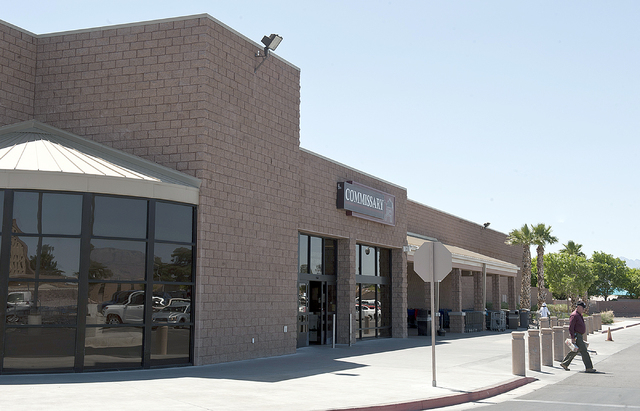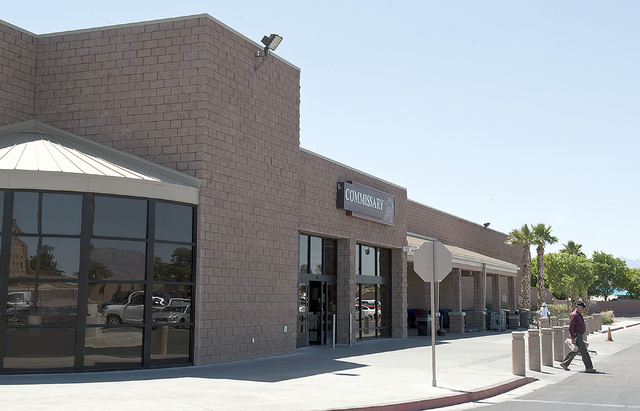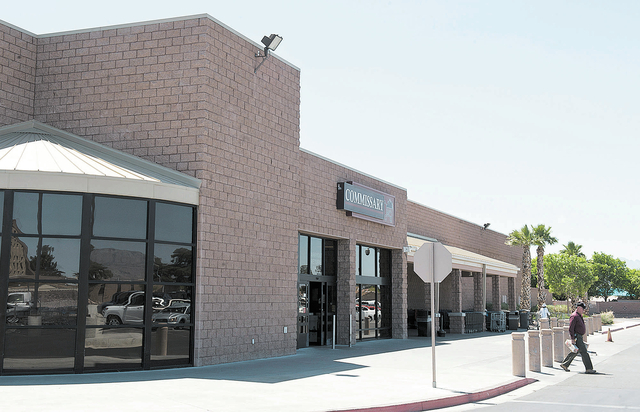Nellis commissary cut debate: Locals say it comes down to keeping a promise
Members of Congress took steps last week to reduce the $1.4 billion that the Pentagon wants to strip from the nation’s military commissaries to save money.
Like the representatives who cast those supportive votes, active-duty personnel and military retirees who buy groceries at the Nellis Air Force Base commissary see it not so much as a money issue as keeping a promise the government made when they signed up to serve the nation.
“It’s part of the overall promise,” said J.J. Schrader, a former Air Force fighter pilot who retired as a lieutenant colonel and shops at the Nellis commissary to stock up on bulk items.
He is among some 81,000 military retirees, National Guard, reserve, active-duty personnel and their families who buy groceries at the commissary.
Defense Department officials, however, say cuts to the commissary need to be made to ensure that a balanced force is equipped and ready for years to come.
“Secretary (Chuck) Hagel and the entire DOD leadership team worked together to build the fiscal year 2015 budget submission and the balanced force our nation needs for the future,” Joy Crabaugh, Pentagon spokeswoman for personnel and readiness, wrote in an email Thursday after the House Armed Services personnel subcommittee voted to leave intact the current health care system, the housing allowance and much of the $1.4 billion in direct subsidies to the commissaries.
The panel’s vote was the first step in a lengthy budget authorization process that will set the course for future defense spending.
“The department submitted a budget request to Congress that we believe is a pragmatic and reasonable approach that protects readiness and modernization, while maintaining a force large enough to fulfill our defense strategy — though with some additional risk for certain missions,” Crabaugh said.
COMMISSARY SAVINGS WOULD DROP
Hagel’s budget plan doesn’t direct the Nellis commissary or any others to close, but patrons would be charged more to fund commissary operations, and savings for those who use commissaries would be reduced from about 30 percent to about 10 percent, according to Department of Defense officials.
A military family of four that shops only at the commissary saves about $4,500 a year because the $1.4 billion in subsidies allows commissaries to sell brand-name items at reduced prices.
Sales last year at the Nellis commissary totaled $53.5 million for 81,234 customers who live within 30 miles of the base. The Nellis commissary employs 104 workers, according to Nancy O’Nell, a spokeswoman for the Defense Commissary Agency in Sacramento, Calif.
Under Hagel’s plan, the commissary system would become partially self-sustaining through a phased reduction that escalates to $1 billion over three years, or $200 million in 2015; $600 million in 2016 and $1 billion in the 2017 fiscal year.
After the subcommittee’s unanimous vote, the full Armed Services Committee is expected to restore half, $100 million of the $200 million that was proposed to be cut from commissary subsidies in the fiscal 2015 budget.
First Command Financial Services Inc., a long-standing financial planning company for families of military and government employees, welcomed the subcommittee’s action as “a promising development that we will watch closely in the days ahead,” according to Mark Leach, First Command’s vice president of media relations.
Before the House panel’s vote, First Command CEO Scott Spiker described Hagel’s initial plan this year to start cuts to commissaries as “an erosion of benefits among many changes” that will affect career service veterans and active- duty personnel.
“Their costs are going up, and this may cut into their savings,” he said. “This is one important stroke in a series of strokes on the painting that’s causing dismay among our military folks.”
The Fort Worth, Texas-based company found that military families spend roughly half of their grocery budget at commissaries. That means, assuming a $500 monthly grocery budget, $270 is spent at the commissary and $230 is spent at off-base grocery stores.
Results released March 31 of a survey commissioned by First Command of 530 U.S. consumers found that roughly two-thirds of military families in pay grades E-6 and above — senior NCOs and commissioned officers — with household incomes of at least $50,000 — identify commissaries as an important part of their current compensation as well as future retirement benefits.
Three out of four respondents said eliminating this taxpayer-subsidized benefit would affect their families negatively.
LOCALS: DON’T BREAK THE PROMISE
Similar sentiments were expressed by Schrader, the retired Air Force pilot, and two other Las Vegas area military retirees who were contacted by the Review-Journal.
Schrader and Vietnam War Army veterans Jack Donahue and Bill Anton all said they felt shopping at the Nellis Air Force Base commissary to buy quality food at reduced prices is part of the overall promise the government made to them for their service. They bristled at the Pentagon’s intent to reduce subsidies to commissaries significantly.
“I don’t think it should be cut at all,” said Anton, a retired lieutenant colonel and Army Ranger Hall of Fame member who shops at the Nellis commissary at least once a week. “It’s one of the benefits we were promised.”
Donahue, a decorated helicopter pilot and former unit commander, said the impact would be felt most by junior enlisted personnel with families.
“They don’t make that much money, and they don’t have that much money for groceries and gas,” he said. Cutbacks to the commissaries would mean “they’d have to pay Albertsons prices.”
“For the majors, colonels and generals, they can all get by. But senior NCOs and retirees and disabled vets, it would have an impact,” Donahue said Friday. He had just returned from his monthly trip to the Nellis commissary to stock up on canned goods, meats, cereals, vegetables and condiments for his household of three.
His bill was about $450. Instead of being taxed, he paid a $23 service charge to cover commissary expenses for workers. He also chipped in $5 for the baggers who took the groceries to his car “because that’s their income. You help the people who work there, the butchers and the stockers, and you help the people who are bagging.”
Still, he took advantage of big savings for groceries and meat of “excellent quality.”
On Friday, there was a sale on salmon and king crab legs and a tent sale for sodas in which he paid less than $2 for a 12-pack of Coke.
Schrader and his wife also shop at the commissary “every other week” to stock up on bulk items.
“The Nellis commissary is great. It’s well-run, clean and efficient,” he said.
Contact Keith Rogers at krogers@reviewjournal.com or 702-383-0308. Find him on Twitter: @KeithRogers2.
























